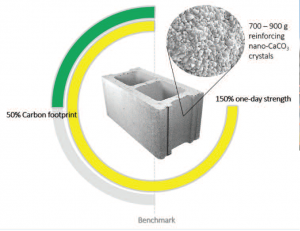STAFF WRITER – The Ontario Construction Report
A longstanding staple for premium autoclave products, Boehmers of Kitchener, owned and operated by Hargest Block Ltd. recently commercialized Carboclave. The innovative manufacturing spin-off with a patented technology yields highly resilient masonry units and diverts carbon emissions from the atmosphere.
Company president Paul Hargest says this successful endeavour was the culmination of six years of intensive R&D efforts involving Boehmers and one of the country’s premier educational/research institutes.
“Proof of concept was first carried out at the laboratory scale, then scaled-up to pilot trials, and finally implemented at the commercial scale,” he explains.
Carboclave uses industry recovered CO2 for the enhanced curing of concrete. “Each standard concrete block cured via this technology sequesters an average 0.7 lbs of CO2. At full plant production, up to seven metric tons of CO2 can be diverted from the atmosphere daily – an unprecedented accomplishment that demonstrates masonry’s viability to store carbon, and potentially aid in achieving Ontario’s Climate Change Action Plan targets.”
Hargest says beyond serving as a storing medium, Carboclave blocks are stronger and more durable than equivalent commercial benchmarks. The CO2 gas acts as an enhancing and expediting curing agent, he says, resulting in very rapid consolidation and strength gain.
“It becomes perpetually embodied in concrete as property enhancing nanoscale calcium-carbonate ( CaCO3) crystals, which reinforce the hardened cement binding matrix. This lends the final concrete tangible improvements in strength and durability, outperforming similar products on the market and scoring higher on environmental attributes.”
He says Carboclave blocks are the preferred choice for site applications that specify highly resilient, environmentallysustainable masonry units (load-bearing and non-load-bearing).
Zaid Ghouleh, co-founder says the precipitation of CaCO3 crystals associates a densification effect, with the highest intensity confined to the very outer layer of the concrete. This effect brings about a decrease in porosity, he says, where the size and volume of the pores, within the pore distribution of the hardened cement paste, are effectively reduced. “In addition to enhancing durability and protecting from deleterious ingress, the dense outer layer also functions as a form of encapsulation to promote further internal hydration of the unreacted cement portion within the concrete. The very high compressive strength achieved by Carboclave blocks after 28 days is a reflection of this feature.”
Figure 1: A typical 20 cm normal-weight Carboclave block with 25% cement replacement (commercial benchmark used for reference are Boehmers’ high-quality autoclaved blocks).
Key attributes:
• Guaranteed sequestration of 0.5 lbs by-product-sourced CO2.
• 50 per cent carbon footprint of equivalent commercial benchmarks
• Higher compressive strength • Better freeze-thaw resistance
• Improved resistance to sulphate attack and chloride permeation
• Greater resistance to drying and service-life shrinkage
• Reduced sorptivity/permeability
• Reduced efflorescence effect
• Consistent colour in production
An additional benefit he says, is that the high strength of Carboclave blocks allows for partial offset of cement content, which is the most ecologically taxing component of concrete.
“Replacing 25 to 50 per cent of the cement content by cementitious fillers can be readily achieved by Carboclave blocks, with no compromise in meeting building specifications. This further lowers the overall carbon footprint, making these blocks the most sustainable among their product segment.”
Hargest says Carboclave blocks are arguably the best masonry products in the market, with regards to resilience and environmental performance.
Table 1 displays how Carboclave blocks compare to Boehmer’s own premium autoclave products. While heavier and denser due to carbon loading, Carboclave blocks also associate higher physical resilience, as clearly demonstrated by strength values.



